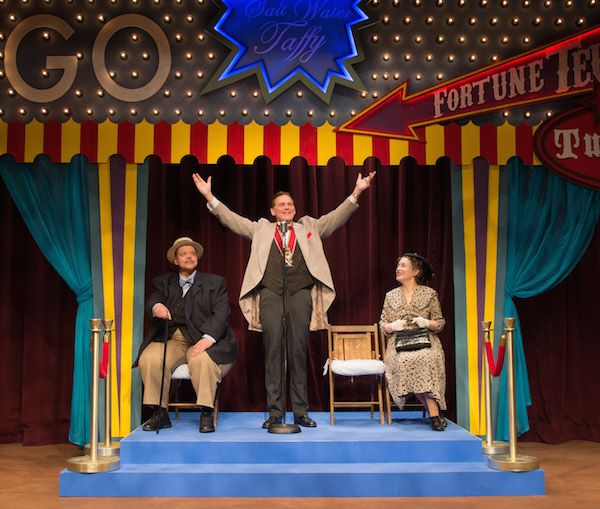Theater Review: “The Skin of Our Teeth” — As Dark as the Daily News
Thornton Wilder’s Big Ideas do not get lost in the hurly-burly of this production.
The Skin of Our Teeth by Thornton Wilder. Directed by Gus Kaikkonen. Staged by the Peterborough Players at 55 Hadley Road, Peterborough, New Hampshire, through July 15.

(l to r) Ray Cote, Jack Koenig, and Dee Nelson in the Peterborough Players production of “The Skin of Our Teeth.” Photo: Will Howell.
By Jim Kates
In The Skin of Our Teeth, the world is about to end. At the end of The Skin of Our Teeth, the world is about to end.
Writing at the beginning of World War II, Thornton Wilder was watching the world he had nostalgically remembered and constructed in Our Town just a few years earlier come to an end indeed. Now, three times in the three acts of the play, the curtain comes down on the eve of destruction. Only, at the end of the third act, the very repetition gives us some inkling that all may not be lost. A “typical” American family wth its sit-com archetypes and tragic flaws, will muddle through. So, by extension, will the human race, you and I.
Mr. Antrobus, played with a square-jawed rectitude (even when he wavers in his domestic virtue) by Jack Koenig, begins the play by inventing the wheel and the alphabet under a looming threat of environmental extinction, and finishes by affiriming democracy, family, and civilization, in that order.
Mrs. Antrobus (a substantially matronly Dee Nelson) puts family first, even as that family includes the “Old Adam” of her husband, the murderous delinquency of their son Henry (K Cody Hunt) who carries the Mark of Cain, and the more frivolous lapses of their daughter Gladys (Tess Borsecnik).
Threading through these lives is the maid-of-all work Sabina, who combines theatrical conventions of soubrette and chorus. It’s more difficult than it seems, and Rebecca Brinkley fulfills it with a brusque efficiency.
Together they make up what came to be optimistically called, in my youth, the “Family of Man.” Antrobus. Family of Man. Adam and Eve, and so on. Get it?
The first time I encountered The Skin of Our Teeth, almost a half century ago, it bewildered and exasperated me. I read the play as a perky, preachy tohu-bohu confected of wink-wink Biblical allusions and invented quotations from Aristotle, a Finnegans Wake for the Broadway masses, magic realism before its time. Its pretentiousness lay in its artful lack of pretentiousness. High schools presented it is a comedy of high-jinks.
It was a lot funnier than it seems these days.
Now, with its unremitting depictions of bourgeois complacency, feminism, environmental disaster, war, disrupted families, it reads darkly like the daily news, as prescient as the Fortune Teller (Kraig Swartz, with more than his usual flair for holding the stage) warning us in vain: “I can see it in your faces. Keep your doubts and despairs to yourself.” Comedy recedes before actuality, and what might have been more funny than sardonic just a few years ago now comes across as more sardonic than funny.
The most chilling words are spoken by Sabina, in the midst of a refugee crisis: “Ladies and gentlemen! Don’t take this play serious. The world’s not coming to an end. . . . . Most people have enough to eat and a roof over their heads. Nobody actually starves — you can always eat grass or something.” These refugees, by the way, include Homer reciting the beginning of The Iliad and Moses, Genesis. Even in the midst of death, we are in life — starting all over again.
The director Gus Kaikkonen keeps the three acts of The Skin of Our Teeth moving quickly — there is, as he has pointed out, so much going on that time onstage flies, if not like an arrow, at least in the circle it’s meant to — managing a large and individualized cast.
Little touches enhance the comic setting. I could single out here the costuming (by Lisa Steett-Liebetrau) of Ray Côté as the Defeated Candidate in the second act. But the Big Ideas do not get lost in the hurly-burly. The third-act confrontation between Mr. Antrobus and Henry carries weight, passion, and resolution.
At the same time that Wilder was writing The Skin of Our Teeth, W. H. Auden covered much the same philosophical and emotional ground in his poem “September 1, 1939” — “Mismanagement and grief / We must suffer them all again.” Like Auden’s poem, the play ends in something more than despair. “The end of this play isn’t written yet,” Sabina reminds us.
The Peterborough Players give us something to see, and to hang on to, showing an affirming flame.
Jim Kates is a poet, feature journalist and reviewer, literary translator and the president and co-director of Zephyr Press, a non-profit press that focuses on contemporary works in translation from Russia, Eastern Europe, and Asia. His latest book is Muddy River (Carcanet), a translation of verse by Russian existentialist Sergey Stratanovsky. His translation of Mikhail Yeryomin: Selected Poems 1957-2009 (White Pine Press) won the second Cliff Becker Prize in Translation.
Tagged: Gus Kaikkonen, Jim Kates, Peterborough Players, The Skin of Our Teeth

“Tohu-bohu” is a term I’ve never encountered before: as a fellow theatre critic who finds himself casting about for le mot juste, I find myself envious of those who can elegantly layer their criticisms with terms or phrases which end up making their reviews crackle with gravitas, rather than trying to talk down to the least common denominator. Theatre should provoke and inspire, and so should theatre criticism: this one does, in spades.
Well done, Mr. Kates, and bravo to the cast and crew of The Skin of Our Teeth.